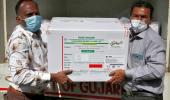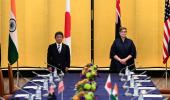The leaders of the four-nation Quad have reaffirmed that they are striving to ensure that the Indo-Pacific is accessible, dynamic and governed by international law and bedrock principles such as freedom of navigation and peaceful resolution of disputes, and free from coercion, sending a clear message to China which is flexing its muscles in the region and beyond.

In an opinion piece in The Washington Post after holding the first Leaders' Summit of Quadrilateral alliance on Friday, Prime Minister Narendra Modi, United States President Joe Biden, Australian PM Scott Morrison and Japanese PM Yoshihide Suga asserted that all countries should be able to make their own political choices, free from coercion.
They said the governments of India, Japan, US and Australia have worked closely for years, and Friday, for the first time in “Quad” history, they convened as leaders to advance meaningful cooperation at the highest level.
"To strengthen our quest for a region that is open and free, we have agreed to partner to address the challenges presented by new technologies and collaborate to set the norms and standards that govern the innovations of the future," the leaders said.
The Quad leaders in the summit on Friday vowed to strive for a "free, open and inclusive" region unconstrained by "coercion".
The virtual Quad summit took place as China and India are involved in a military standoff along the Line of Actual Control in eastern Ladakh since May last year.
China is also engaged in hotly contested territorial disputes in both the South China Sea and the East China Sea. In the East China Sea, Japan has maritime disputes with China.
In the opinion piece after the summit, the leaders said the cooperation, known as “the Quad,” was born in crisis. It became a diplomatic dialogue in 2007 and was reborn in 2017.
"In December 2004, the continental shelf off the coast of Indonesia shifted two metres, creating one of the largest tidal waves in modern history and a nearly unprecedented humanitarian crisis around the Indian Ocean. With millions displaced and hundreds of thousands killed, the Indo-Pacific region sounded a clarion call for help. Together, our four countries answered it," they wrote.
Australia, India, Japan and the US -- a group of democratic nations dedicated to delivering results through practical cooperation -- coordinated rapid humanitarian assistance and disaster relief to people in need, they wrote.
"Now, in this new age of interconnection and opportunity throughout the Indo-Pacific, we are again summoned to act together in support of a region in need," they said.
Since the tsunami, climate change has grown more perilous, new technologies have revolutionised our daily lives, geopolitics have become ever more complex, and a pandemic has devastated the world.
"Against this backdrop, we are recommitting to a shared vision for an Indo-Pacific region that is free, open, resilient and inclusive. We are striving to ensure that the Indo-Pacific is accessible and dynamic, governed by international law and bedrock principles such as freedom of navigation and peaceful resolution of disputes, and that all countries are able to make their own political choices, free from coercion," they wrote.
The four leaders asserted that in recent years, that vision has increasingly been tested and those trials have only strengthened their resolve to reckon with the most urgent of global challenges together.
"It is clear that climate change is both a strategic priority and an urgent global challenge, including for the Indo-Pacific region. That's why we will work together and with others to strengthen the Paris agreement, and enhance the climate actions of all nations."
On their commitment to fight against the coronavirus pandemic, they said, it is among the greatest risks to health and economic stability in recent history, and the Quad nations must work in partnership to stop it in its tracks.
"With an unwavering commitment to the health and safety of our people, we are determined to end the COVID-19 pandemic because no country will be safe so long as the pandemic continues," the four leaders wrote.
"Now, we are launching an ambitious effort to help end COVID-19. Together, we pledge to expand and accelerate production in India of safe, accessible and effective vaccines. We will partner at each stage to ensure that vaccines are administered throughout the Indo-Pacific region into 2022."
The Quad on Friday finalised a landmark initiative under which huge investments will be made in India to create additional production capacities to roll out a billion coronavirus vaccine doses by 2022 for exports to the Indo-Pacific region, seen as a significant step to counter China's expanding vaccine diplomacy.
"We will combine our scientific ingenuity, financing, formidable productive capacity and long history of global-health partnership to surge the supply of life-saving vaccines, in close collaboration with multilateral organizations including the WHO and Covax Facility," they wrote.
Emphasising that the Quad nations' foundations of democracy and a commitment to engagement unite them, the four leaders concluded saying, "We know we can provide for the safety and prosperity of our people at home by confronting global crises together, with purpose? and resolve. We summon from tragedy the strength and resilience to unify and overcome. And we recommit ourselves, once again, to an Indo-Pacific region that is free, open, secure and prosperous."









